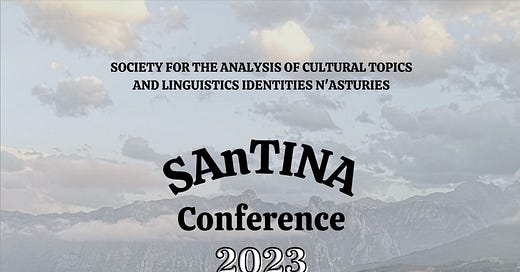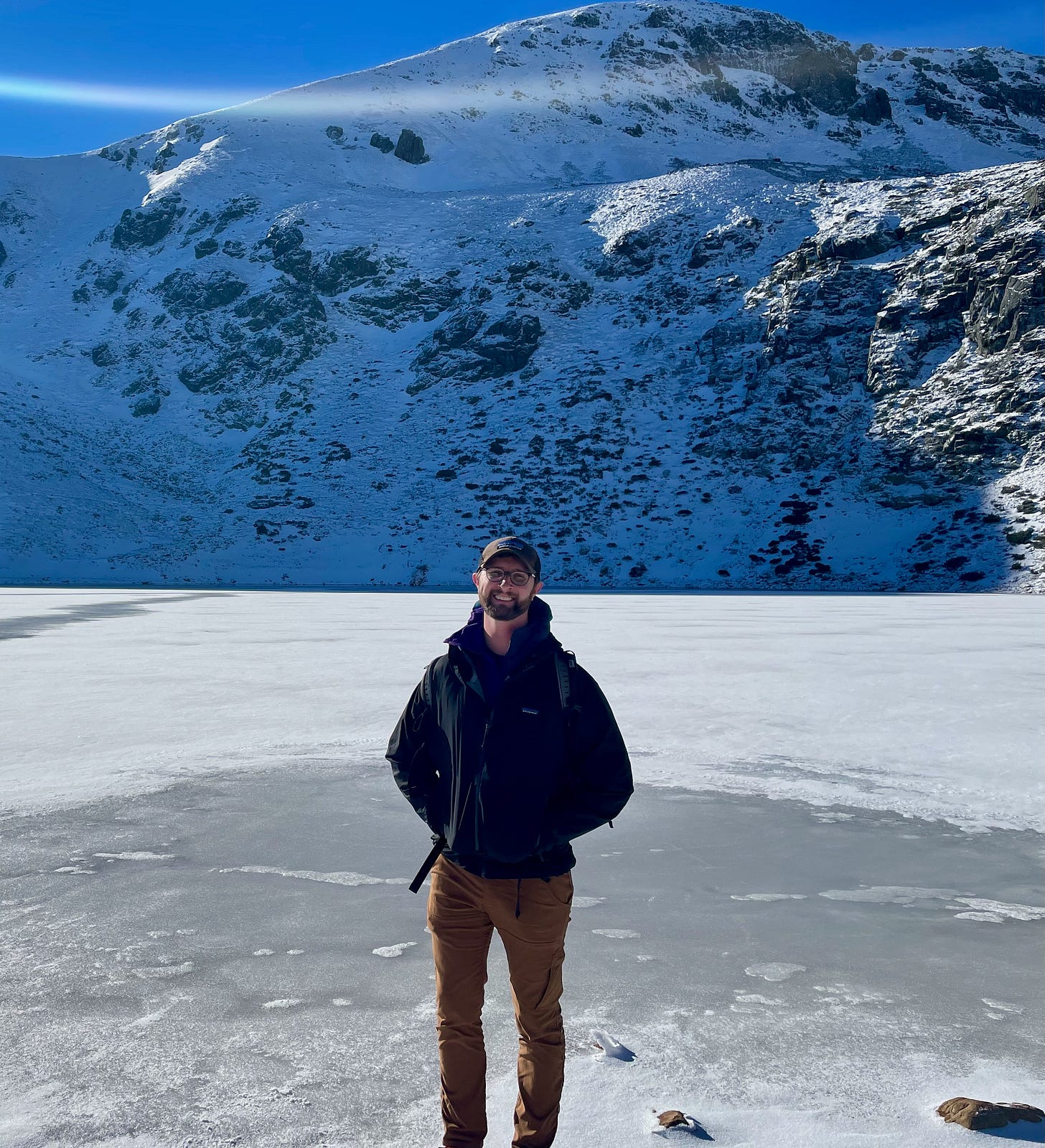Asturian Studies Newsletter, Winter 2023
Welcome! This newsletter features our upcoming conference and our activity this last fall: building community, presenting at conferences, and publishing and advancing research. Thank you for reading!
II SAnTINA Conference
Virtual (organized by Oklahoma State University), May 3-4, 2023
You are still on time to submit a proposal for our upcoming conference: II SAnTINA, the conference of Asturian Studies and the Society for the Analysis of cultural Topics and linguistic Identities N’Asturies. The deadline is January 15th.
This second iteration of the SAnTINA conference is organized by Isabel Álvarez Sancho and Oklahoma State University, and it will be held completely virtually. Our scientific committee includes prestigious researchers from various international universities. The conference continues to be free of charge to all presenters and attendees.
Submission Guidelines
Abstracts and participants’ information must be submitted through this google form by January, 15th, 2023 (extended deadline): https://docs.google.com/forms/d/e/1FAIpQLSe1ypsNN6n2A7-SlG_la-ZjN3l6A7xh_WYsUs3lOv1rapHvQg/viewform
Authors may submit up to two abstracts, one individual and one jointly.
Contributions may be in Asturian, Spanish, English or a combination of them.
Notifications of acceptance will be sent starting January 31st, 2023.
Visit the conference webpage for more information, and to learn about our history. The inaugural SAnTINA conference was organized by Prof. Covadonga Lamar Prieto, President of Asturian Studies/SAnTINA and Miriam Villazón Valbuena, community manager for Asturian Studies/SAnTINA, and was hosted by the University of California-Riverside.
Please direct any questions to: santinaconference@gmail.com
What We Did This Fall
El cafetín de les cigoreyes
by Covadonga Lamar Prieto
La mio güela Carmina, que de tar viva tendría 101 años, tuvo unes amigues tola vida. Paisanes de Xixón, de les que sabíen ónde tuviera el mercáu’l aire y teníen fondes alcordances del de San Agustín. Yeren muyeres sólides. Nun ye solo que pasaren la guerra, que tamién, sinón qu’amás tuvieren qu’aguantar paisanos y más paisanos dándo-yos llecciones de coses de les qu’elles yá veníen de vuelta. Xuntábense, como fiximos siempres les muyeres, para sofrir la vida en comunidá.
Siguieron xuntándose a tomar un cafetín hasta que les piernes nun tuvieron por elles. Cuando mio Pa les vía salir, con 70, 80, dalgunes con 90 años al recostín, dicíame: Covina, pa’ casa que ya baxaron les cigoreyes. Yera meyor guardase delles, dexa-yos cai pa correr camín del Muro. Si nos atrapaben pel camín a les mis amigues y a mí, dábennos mensaxes tan distintos como yeren elles ente sí: una mandábate pa misa, y qué mocedá tan perdío, que ya nun sabe nin cómo se llama’l párrocu. Otra rezaba porque siguíes gastando’l mismu mozu, y ai ratu bobu, nestos tiempos, tener un mozu pudiendo tener seis.
D’esi pañu cortáronnos a munches, y a munchos, n’Asturies: esi glayar pa que les siguientes xeneraciones pudieren esfrutar de la llibertá que se yos negara a elles; esa sestaferia que fai falta pa caleyar les desgracies, les bayures y tolo nidio del mediu, les unes colos otros. Distintes postures, otres opiniones: respetu siempres pola espalda y, si hubiere necesidá, verdaes a la cara.
Times have changed but, at the same time, many important things have remained the same. It was that spirit of sharing, of moving through (academic) life together that encouraged a small group of us to gather weekly to write, to share the anguishes of publication, conference organizing, and teaching. The collective crafting of culture and the building of an intellectual space has a lot to do with the social and emotional work that the original cigoreyes masterfully handled. They kept together, frequently by whispering in the kitchen, the ingredients of all that is true: flavors, smells and words. Recetes de sopa de pixín que, como diz la mi amiga Irene, tienen más pasos qu’un tangu. Like these women, the next generation of cigoreyes aims to gather for a cup of coffee and establish a net of solidarity, mutual support, and community.
While les cigoreyes from Nature (Vanellus Vanellus) and those from Memory (les de Xixón) descended towards the water, we got together every week on another kind of stream. This new generation of cigoreyes is digital, co-ed and with different time zones involved. During the Fall of 2022, we met on Tuesdays. For some of us it was morning, for others afternoon, even early evening. We had some light conversation, a bit of catch up, and then time to write. It was not only fruitful, but also replenishing. It made my day, my week better. In a professional world that values atomization, elbowing and saving your own… let’s say laptop, it is extremely satisfactory to sink our heels on the ground and, calmly, say: No. This is not the way in which we will conduct ourselves. We want to intentionally get back to the values of shared building of knowledge in which we were raised.
We will continue to meet this Winter, and everyone with an interest in writing in community is welcome at our cafetín. Bring your academic or non-academic writing. Bring projects, ideas, seek and provide advice. We are crafting together an updated version of Carmina’s sopa de pixín: same ingredients, new tools involved.
XL Xornaes Internacionales d’Estudiu
Universidá d’Uviéu, Payares 2022
by Paquita Suárez Coalla
Nos díes 8, 9 y 10 de payares de 2022, y baxo’l títulu de “La llingua asturiana: Una güeyada dende fuera d’Asturies”, celebráronse les XL Xornaes Internacionales d’Estudiu que coordina l’Academia de la Llingua cada seronda na Facultá de Filosofía y Lletres de la Universidá d’Uviéu. El pesu principal de les xornaes sofitóse esti añu nun grupu de profesores d’orixe asturianu, educaos na mayoría los casos na universidá d’Uviéu, y venceyaos a distintes instituciones universitaries de los Estaos Uníos onde fai tiempu que trabayen. Esta güeyada parcialmente periférica, que xorrez nun contestu ayenu a la esperiencia llingüística del asturianu, foi nesos tres díes el puntu de partida pa un averamientu a la llingua enllenu de matices nuevos, l’espaciu que nos dexa facer otros análisis d’esa llingua que se lleva dientro y qu’abre les puertes a un diálogu necesariu ente los asturianos que nos fuimos y aquellos que que se quedaron. Aparte de la presentación habitual de los nuevos númberos de les revistes Lletres Asturianes (127) y Ciencies: Cartafueyos Asturianos de Ciencia y Teunoloxía (12), les xornaes contaron con un total de 18 ponencies al rodiu d’una bayura d’aspeutos llingüísticos, lliterarios e históricos de la llingua asturiana, y peslláronse con una valoración entusiasta y abondo optimista tanto por parte del actual presidente de L’Academia de la Llingua, Xosé Antón González Riaño, como de l’anterior presidenta de la institución Ana Cano González.



SIALNI: Simposios Internacionales Aspectos Lingüísticos del Noroeste Ibérico
University of Oviedo, Fall 2022
by Miguel Rodríguez Monteavaro
Los díes 17 y 18 de noviembre de 2022 los departamentos de Filoloxía Española y de Filoloxía Clásica y Románica de la Universidá d'Uvieo albergaron el II Simposiu Internacional "Aspectos Llingüísticos del Noroeste Ibéricu" (SIALNI2). Esti eventu foi la continuación del taller Aspectos Filológicos y Sociolingüísticos del Noroeste Ibérico, que se fixera online'l 21 de mayo de 2021 nel marcu del IX Congreso Internacional de Lingüística Contrastiva (Xénova, Italia). L'éxitu d'esti SIALNI2 foi notable, tanto por participación, como por calidá de les presentaciones, onde se faló de dialectoloxía, llingüística xeneral, llingüística histórica, lexicografía, fraseoloxía y sociollingüística nel ámbitu de les variedaes llingüístiques del cuadrante noroeste de la Península Ibérica.
El Comité Organizador del eventu, formáu polos filólogos Miguel Rodríguez Monteavaro, Fernando Álvarez-Balbuena y Enrico Torre, pasó'l testigu na última sesión del SIALNI2 a un grupu de colegues de la Universidad de Salamanca, que coordinarán lo que va ser el SIALN3 d'a principios d'octubre de 2023.
Featured Publication
Álvarez Sancho, Isabel. “New Tradition and Activism in Minoritized-Language Communities: The Time of post-2008 Asturian Music”, Lletres Asturianes, 127 (2022)
by Isabel Álvarez Sancho
In this article, published by Lletres Asturianes last October, I unveil the intersections between tradition, language and activism in recent Asturian music. I study the music of Rodrigo Cuevas, arguably the most recognized new musician inside and outside Asturias; Ún de Grao, the musical project of Xosé Martínez Álvarez, a member of the so-called “post-folk” generation whose main aim is to revitalize the tonada; and the Coru Antifascista Al Altu la Lleva, which, born in the environment of the association of musicians Caja de músicos, continues the tradition of choral music and explicitly engages in activism, both with noted Asturian musician Nacho Vegas and as an independent ensemble. This analysis shows how, through music, Asturias and the Asturian language both participate and respond to local, national and international trends which, drawing upon tradition, create unique ways of resignifying the past and of influencing the present and the future.
The complete article, in English, can be accessed through the Lletres Asturianes page here.
The musical portal www.musicasturiana.com wrote a review of it (in Asturian), which can be found here.
Like most of the work by the Asturian Studies group, this research was developed within an international setting, and was made possible by a variety of people and institutions. I presented a previous, reduced version of this study for the first time in the I SAnTINA conference. I also shared part of this manuscript in the “Asturian Studies” seminar celebrated in the University of Oviedo, within the conference ALCESXXI. The complete research for this article, including the interviews with the artists, was funded by a Humanities, Arts and Design Research Grant from my institution, Oklahoma State University. I would specially like to thank Rodrigo Cuevas, Xosé Martínez Álvarez, Aníbal López Marcos and Emma González García for taking the time to talk with me about their art and activism.
Featured Researcher: Luke Bowe
by Luke Bowe
Greetings from Gijón! My name is Luke Bowe, and I am a PhD candidate in New York University’s Department of Spanish and Portuguese Languages and Literatures. For the 2022-2023 academic year, I have been awarded a Fulbright US Student grant to conduct dissertation research at the Universidad de Oviedo with the support and mentorship of Professors Jorge Uría and Rubén Vega García, and in collaboration with the GRUHSOC Sociocultural History research group.
In my dissertation, I analyze industrialization and rural decline in Asturias under Franco through a cultural studies framework, engaging with literary, cinematic, propagandistic, and other cultural representations of the region. In doing so, I take Asturias, which has remained largely understudied, particularly in the anglophone academy, as a case study to better understand Francoism through a regional framework. My research combines film studies, literary analysis, oral history, and archival research to trace the impact of Francoism on the economy, culture, people, and physical territory of Asturias. I am also interested in the ways these impacts continue to reverberate into the present, particularly in the sphere of cultural production. In parallel to my dissertation, I’ve been researching how (de)industrialization in the region continues to inspire the work of contemporary artists, writers, and filmmakers in Asturias today.
This also marks my second year as a proud member of the SAnTINA community. I’ve been inspired by the passionate engagement with the language, culture, and history of Asturias and especially the sense of camaraderie among the members. After a particularly generative week with the Asturian Studies group at ALCESXXI this summer here in Oviedo, I’m looking forward to continuing those conversations and starting new ones at the second annual SAnTINA conference in May!
¡Gracies por lleenos!
Asturian Studies / SAnTINA Newsletter, January 2023
Isabel Álvarez Sancho: Editor in chief and contributor
Covadonga Lamar Prieto: Editor and contributor
Miriam Villazón Valbuena: Editor
Luke Bowe: Contributor
Miguel Rodríguez Monteavaro: Contributor
Paquita Suárez Coalla: Contributor







